Add this eBook to your basket to receive access to all 277 records. Our indexes include entries for the spelling arundel. In the period you have requested, we have the following 277 records (displaying 1 to 10): These sample scans are from the original record. You will get scans of the full pages or articles where the surname you searched for has been found. Your web browser may prevent the sample windows from opening; in this case please change your browser settings to allow pop-up windows from this site. Grantees of royal lands and pardons
(1129-1130)
The Great Rolls of the Pipe are the central record of the crown compiling returns of income and expenditure from the sheriffs and farmers of the various English counties or shires. This is the oldest series of public records, and the earliest surviving instances of many surnames are found in the Pipe Rolls. This is the earliest surviving roll, believed to be from the 31st year of the reign of king Henry I, that is, accounting for the year from Michaelmas 1129 to Michaelmas 1130: this is a period for which there are no other general English records, so these rolls give details of many persons and incidents otherwise utterly unknown. Most (but not all) of the entries in which names appear relate to payments for grants of land and pardons. There is a separate return in each year for each shire, the name of the shire being here printed at the top of each page. Wales was still independent, in separate kingdoms, at this period, and is not included, except for 'Herefordshire in Wales'. There is virtually no reference to the palatinates of Chester, Lancaster and Durham, or to Cumberland and Westmoreland in the far northwest. | Sample scan, click to enlarge
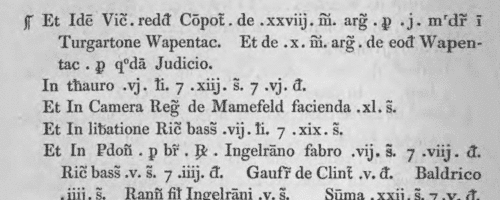
| Grantees of royal lands and pardons
(1175-1176)
The Great Rolls of the Pipe are the central record of the crown compiling returns of income and expenditure from the sheriffs and farmers of the various English counties or shires. This is the oldest series of public records, and the earliest surviving instances of many surnames are found in the Pipe Rolls. This is the roll for the 22nd year of the reign of king Henry II, that is, accounting for the year from Michaelmas 1175 to Michaelmas 1176. Most (but not all) of the entries in which names appear relate to payments for grants of land and fines or pardons. The large number of payments of fines for forest transgressions has been interpreted as a form of compounding for pardons by those who had rebelled during the recent years of unrest; or, looking at it in a different way, a form of extortion from the king in order to raise money to pay off the mercenaries with whose help he had quelled the rebellions. There is a separate return in each year for each shire, the name of the shire being here printed at the top of each page. Wales was still independent, in separate kingdoms, at this period, and is not included, except for 'Herefordshire in Wales'. | Sample scan, click to enlarge
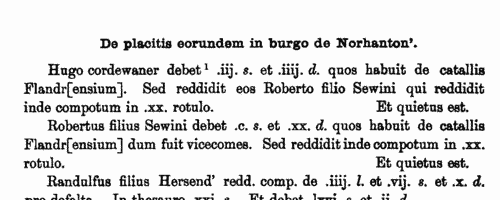
| Grantees of royal lands and pardons
(1176-1177)
The Great Rolls of the Pipe are the central record of the crown compiling returns of income and expenditure from the sheriffs and farmers of the various English counties or shires. This is the oldest series of public records, and the earliest surviving instances of many surnames are found in the Pipe Rolls. This is the roll for the 23rd year of the reign of king Henry II, that is, accounting for the year from Michaelmas 1176 to Michaelmas 1177. Most (but not all) of the entries in which names appear relate to payments for grants of land and fines or pardons. The large number of payments of fines for forest transgressions has been interpreted as a form of compounding for pardons by those who had rebelled during the recent years of unrest. There is a separate return in each year for each shire, the name of the shire being here printed at the top of each page. Wales was still independent, in separate kingdoms, at this period, and is not included, except for 'Herefordshire in Wales'. | Sample scan, click to enlarge
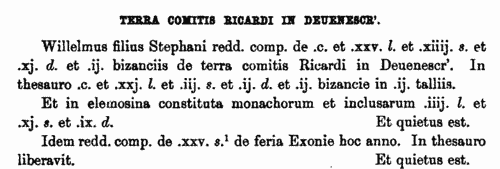
| Donzels, damsels and widows in eastern England
(1185)
The Rotuli de Dominabus et Pueris et Puellis de Donatione Regis contain abstracts of inquisitions taken in the 31st year of king Henry II in Lincolnshire, Northamptonshire, Bedfordshire, Buckinghamshire, Rutland, Huntingdonshire, Norfolk, Suffolk, Hertfordshire, Essex, Cambridgeshire and Middlesex, taken by Hugh de Morewich, Ralph Murdac, William Vavassur and master Thomas de Hesseburn, justices in eyre, for the purpose of ascertaining the wardships, reliefs and other profits due to the king from widows and orphans of his tenants in capite (in chief); minutely describing their ages and heirship, their lands, the value of them, the beasts upon them, and the additional quantity necessary to complete the stock. The text of the rolls survived in a 17th-century copy, Harleian MS 624 in the British Museum, and this was edited and published by Stacey Grimaldi in 1830. | Sample scan, click to enlarge
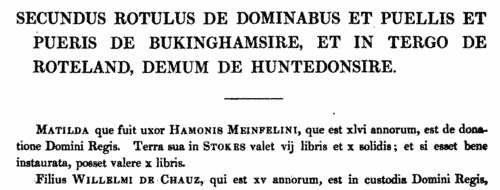
| Pipe Rolls: Archbishopric of York
(1189-1190)
The Great Rolls of the Pipe contain returns of income and expenditure from the sheriffs and farmers of the various English sheriffdoms, counties or shires and from honors in the hands of the crown. This is the roll for the 1st year of the reign of king Richard I, that is, accounting for the year from Michaelmas 1189 to Michaelmas 1190. Many of the individual surnames that appear are in the accounts of fines &c. levied by justices. | Sample scan, click to enlarge
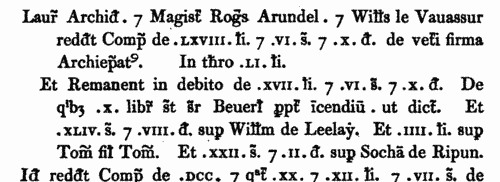
| Pipe Rolls: Dorset and Somerset
(1189-1190)
The Great Rolls of the Pipe contain returns of income and expenditure from the sheriffs and farmers of the various English sheriffdoms, counties or shires and from honors and bishoprics in the hands of the crown. This is the roll for the 1st year of the reign of king Richard I, that is, accounting for the year from Michaelmas 1189 to Michaelmas 1190. Many of the individual surnames that appear are in the accounts of fines &c. levied by justices. | Sample scan, click to enlarge
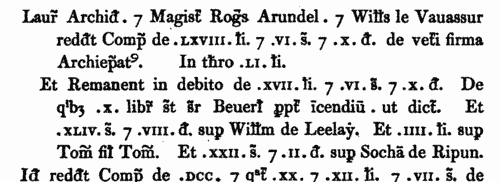
| Feet of Fines at Westminster: Hampshire Cases
(1198)
Pedes Finium - law suits, or pretended suits, putting on record the ownership of land. This transcript of the feet of fines of the '9th' year of the reign of king Richard I (3 September 1197 to 2 September 1198) was published by the Pipe Roll Society in 1898. The form of these proceedings is fairly standard: giving the date, the place of the hearing, and the names of the justices; the names of the plaintiffs (petentes) and defendants (tenentes) and a brief description of the land in question; the outcome of the case is a quitclaim by one party to the other, with a payment of a suitable sum. These cases were heard at Westminster: the original roll misdates the fines in the justices' eyre to the 9th rather than the 10th year of the reign, and this error may also relate to those at Westminster. In the printed copy the dates given in the margin may be 1197 where they should read 1198, or 1198 where they should read 1199, and may also be 1 or more days out. | Sample scan, click to enlarge
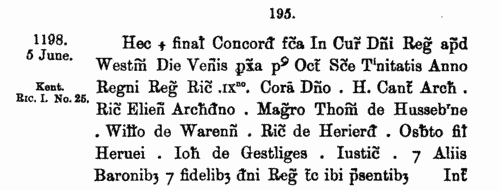
| Early Charters of St Paul's Cathedral
(1200-1209)
The Liber A or Pilosus of St Paul's cathedral, London, was initiated in 1241 as an attempt at copying all the charters, chirographs and other diverse writings found in the treasury of the church; after that original project was abandoned, the codex came to be used as a general register or cartulary. The first portion was edited for the Royal Historical Society by Marion Gibbs and printed in 1939. Where the original charters also survived, or a better text was found in Liber L, she used these superior sources. Liber A never became a complete register of the cathedral's charters; nor are the charters it contains necessarily the most important, nor were they grouped chronologically or geographically. The text remains as a record of part of the great landed wealth of the church in London and nearby. The persons that appear are the grantors, justices, those named in the descriptions of property, and the witnesses. | Sample scan, click to enlarge
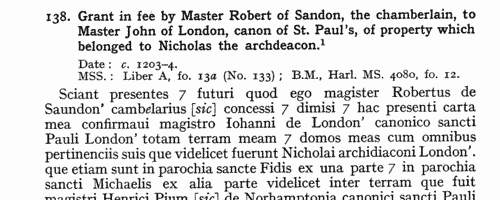
| Pleas of the Forest at Shrewsbury
(1209)
Pleas of the forest, heard at Shrewsbury on Saturday after Mid-Lent in the 10th year of the reign of king John, 14 March 1209, recorded in Public Record Office Forest Proceedings, Treasury of Receipt, No. 144, were selected, transcribed (the Latin extended) and translated by G. J. Turner and published by the Selden Society in 1901. The text and translation are printed on facing pages. | Sample scan, click to enlarge
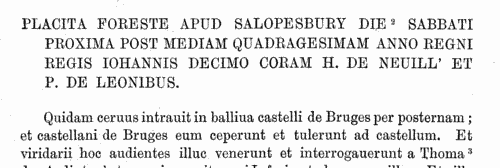
| Feet of Fines for Devon
(1195-1214)
Pedes Finium - law suits, or pretended suits, putting on record the ownership of land in the county. This transcript was prepared for the Commissioners of the Public Records by Joseph Hunter, and printed in 1844. It covers entries for the county from the surviving rolls from the 7th year of the reign of king Richard I to the 16th year of king John. | Sample scan, click to enlarge
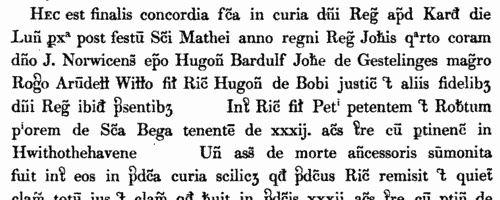
|
Research your ancestry, family history, genealogy and one-name study by direct access to original records and archives indexed by surname.
|











